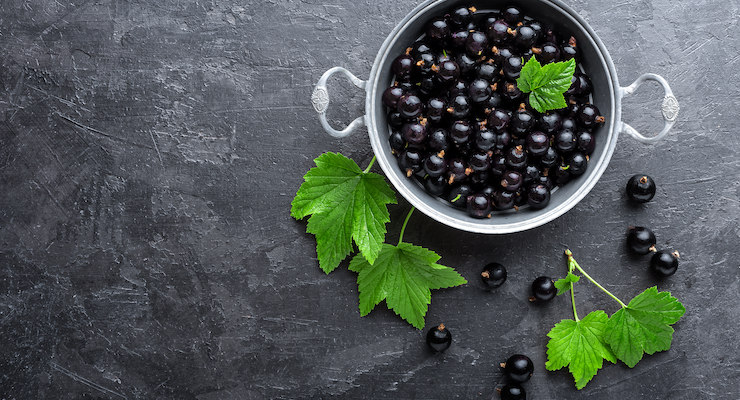12.03.20
In a study conducted by the University of Eastern Finland and Savonia University, researchers found that blackcurrants, a berry rich in polyphenols, anthocyanins, and antioxidants, were able to beneficially regulate glucose metabolism, by attenuating the blood glucose spikes and delaying the fall of blood glucose in participants following a meal.
Interestingly, blackcurrants are often consumed with added sugar because of their sour taste, but this didn’t have the same negative health consequences as sugar consumed without berries. A significant effect on post-meal glucose response was achieved with just 75 g of blackcurrants, which the authors of the study said was remarkably smaller than the portions used in prior studies.
The study involved 26 healthy participants (22 female, 4 male) who consumed three different test products and sugar water as a control product at four separate study visits. The four test products were blackcurrant puree with added sugar, blackcurrant containing fermented quinoa, and a blackcurrant product base without blackcurrants. The test product containing fermented quinoa was used in the study due to their perception as healthy by consumers, and a “well-fitted matrix for palatable snack products,” the authors said.
The carbs and sugar components of each product were similar. Blood samples were taken before the meals in fasting state, and postprandially at 15, 30, 45, 60, 90, 120, and 180 minutes after consuming the meal, which were analyzed for glucose, insulin, and free fatty acids.
Compared to sugar water, both products which actually contained blackcurrant attenuated postprandial glycemic response, which was seen in reduced maximums of both glucose and insulin, a delayed fall of glucose, and a delayed rise of free fatty acids because of hypoglycemia.
It is believed that, with blackcurrant usage over a longer period of time, this type of berry could be a candidate as a natural ingredient with benefits to type II diabetes management, the authors said, especially due to smaller variations in blood glucose and insulin levels, as well as improved insulin sensitivity observed during the study.
While the EU has not authorized any health claims for berries, the authors point to many studies over the past several years which have yielded evidence that dark berries, such as blackcurrant and bilberry, have the most convincing results when it comes to effects on glucose metabolism. The same effect has been demonstrated in other clinical trials run specifically on anthocyanins extracted from blackcurrants, and, additionally, polyphenolic compounds appear to slow down the absorption of glucose from the small intestine by interacting with carbohydrate-digesting enzymes and glucose transport proteins. Furthermore, polyphenolic compounds may reduce oxidative stress and beneficially modulate inflammation, the authors said.
Interestingly, blackcurrants are often consumed with added sugar because of their sour taste, but this didn’t have the same negative health consequences as sugar consumed without berries. A significant effect on post-meal glucose response was achieved with just 75 g of blackcurrants, which the authors of the study said was remarkably smaller than the portions used in prior studies.
The study involved 26 healthy participants (22 female, 4 male) who consumed three different test products and sugar water as a control product at four separate study visits. The four test products were blackcurrant puree with added sugar, blackcurrant containing fermented quinoa, and a blackcurrant product base without blackcurrants. The test product containing fermented quinoa was used in the study due to their perception as healthy by consumers, and a “well-fitted matrix for palatable snack products,” the authors said.
The carbs and sugar components of each product were similar. Blood samples were taken before the meals in fasting state, and postprandially at 15, 30, 45, 60, 90, 120, and 180 minutes after consuming the meal, which were analyzed for glucose, insulin, and free fatty acids.
Compared to sugar water, both products which actually contained blackcurrant attenuated postprandial glycemic response, which was seen in reduced maximums of both glucose and insulin, a delayed fall of glucose, and a delayed rise of free fatty acids because of hypoglycemia.
It is believed that, with blackcurrant usage over a longer period of time, this type of berry could be a candidate as a natural ingredient with benefits to type II diabetes management, the authors said, especially due to smaller variations in blood glucose and insulin levels, as well as improved insulin sensitivity observed during the study.
While the EU has not authorized any health claims for berries, the authors point to many studies over the past several years which have yielded evidence that dark berries, such as blackcurrant and bilberry, have the most convincing results when it comes to effects on glucose metabolism. The same effect has been demonstrated in other clinical trials run specifically on anthocyanins extracted from blackcurrants, and, additionally, polyphenolic compounds appear to slow down the absorption of glucose from the small intestine by interacting with carbohydrate-digesting enzymes and glucose transport proteins. Furthermore, polyphenolic compounds may reduce oxidative stress and beneficially modulate inflammation, the authors said.




























